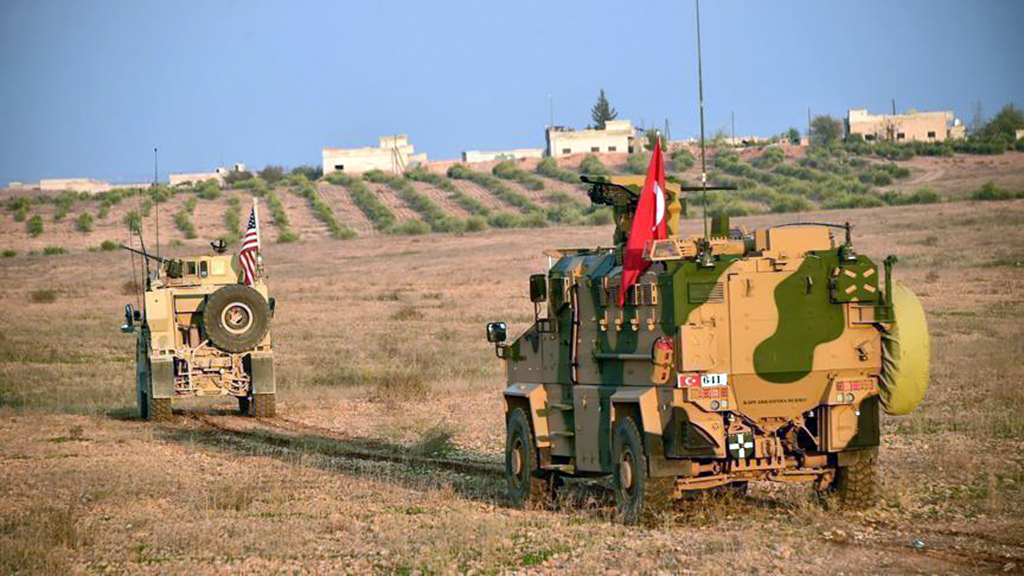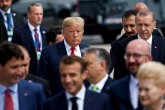The United States is revising its decision to exit Syria.
Washington initially hoped to complete the withdrawal by April or, at the latest, the summer months. Yet the White House announced last week that 200 U.S. troops would remain on the ground for an unspecified amount of time to promote peace.
The Trump administration also reaffirmed its commitment to work with Turkey on the proposed safe zone. Interestingly enough, that announcement – like the U.S. decision to withdraw – came after a phone call between U.S. President Donald Trump and President Recep Tayyip Erdogan, his Turkish counterpart. Shortly before the announcement, the Europeans had made it clear that they would not remain in Syria if the United States were to leave.
How do we make sense of Washington’s revised plan? Is the reduction of U.S. troops in Syria from 2,000 to 200 an attempt to slow down the withdrawal or a temporary measure to manage the challenges of setting up a safe zone? First of all, Washington came to the realization that a rapid and total withdrawal would prevent it from reaching its multiple, contradictory goals simultaneously.
At this point, Trump’s policy team appears to have exhausted all options – except to create a safe zone together with Turkey. Provided that U.S. military leaders threaten to cut aid to the YPG militants if it were to cooperate with the Assad regime, it seems that handing over the YPG-controlled territory to Russia and the Assad regime is not on the table. Nor is it possible to form a coalition force without the United States. The only remaining alternative is to enforce a safe zone in cooperation with the Turks.
The following, however, remains unclear: Was the decision to keep 200 U.S. troops in Syria an attempt to include the Europeans or work out a gradual solution with Ankara on the YPG problem? Or did Washington seek to meet a demand for protection by the YPG militants? Trump’s policy team will reach the conclusion, sooner or later, that setting up a safe zone with Turkey is a necessity. After all, the European presence is a secondary concern and 200 troops won’t be able to protect the YPG militants forever.
A visit by the Turkish Defense Minister Hulusi Akar and the Chairman of the Chief of the Turkish Armed Forces, Gen. Yasar Güler, to Washington last week marked possibly the first step in that direction. Several senior U.S. officials are expected to visit Turkey in coming days. Let us hope that those talks will yield positive results.After all, the proposed safe zone creates a window of opportunity for Turkey and the U.S. to find a way out of a particularly tense episode in their relations. The U.S. withdrawal could make it possible for the two nations to repair their relations, which had been strained by the Syrian civil war. Obviously, the S-400 debate must be shelved for now in order to make progress in the safe zone negotiations.
[Daily Sabah, 25 February 2019]
In this article
- Opinion
- CENTCOM
- Civil War
- DAESH
- Daily Sabah
- Donald Trump
- East of the Euphrates
- Europe
- Fight against DAESH
- Hulusi Akar
- Islamic Republic of Iran
- Kurdistan Workers' Party Terrorist Organization (PKK)
- Middle East
- NATO
- NATO Ally
- Operation Euphrates Shield
- Peace Corridor
- People's Protection Units (YPG)
- PKK - YPG - SDF - PYD - YPJ - SDG - HBDH - HPG - KCK - PJAK - TAK - YBŞ
- Recep Tayyip Erdoğan
- Russia
- S-400 Triumph Air Defence Missile System
- Safe Zone
- Syria
- Syrian Civil War
- Syrian Conflict
- Syrian Crisis
- Syrian Democratic Forces (SDF)
- Syrian National Army (SNA)
- Syrian National Coalition
- Syrian Opposition
- Syrian Refugees
- Terrorism
- Trump Administration
- Trump’s Syria Withdrawal
- Turkish Armed Forces (TAF) | (TSK)
- Turkish Defense Minister
- Turkish Foreign Policy
- Turkish-American Relations
- Türkiye
- Türkiye-US Relations
- Türkiye-US Security Relations
- Türkiye's Foreign Policy
- Türkiye's Operation Peace Spring
- Türkiye’s Operation Olive Branch
- United States (US)
- US Military
- US President
- US Withdrawal from Syria
- US-PKK/PYD/YPG/SDF Relations
- US-Terror Relations
- Vladimir Putin



